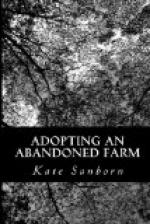“That fat, white creature must be killed; just eats her old head off—will soon be too tough”—Ugh! Here Tom comes with five headless fowls. Wasn’t that a weird fancy of mine?
Truly “Me and Crankin’s two different critters.”
From the following verse, quoted from a recent poultry magazine, I conclude that I must be classed as a “chump.” As it contains the secret of success in every undertaking, it should be committed to memory by all my readers.
“Grit makes the man,
The want of it the chump.
The men who win,
Lay hold, hang on, and hump.”
CHAPTER VI.
GHOSTS.
“But stop,” says
the courteous and prudent reader, “are there
any
such things as ghosts?”
“Any ghostesses!” cries Superstition, who settled long since in the country, near a church yard on a “rising ground,” “any ghostesses! Ay, man, lots on ’em! Bushels on ’em! Sights on ’em! Why, there’s one as walks in our parish, reglar as the clock strikes twelve—and always the same round, over church-stile, round the corner, through the gap, into Shorts Spinney, and so along into our close, where he takes a drink at the pump—for ye see he died in liquor, and then arter he squenched hisself, wanishes into waper.
“Then there’s the ghost of old Beales, as goes o’ nights and sows tares in his neighbor’s wheat—I’ve often seed ’em in seed time. They do say that Black Ben, the poacher, have riz, and what’s more, walked slap through all the squire’s steel traps, without springing on ’em. And then there’s Bet Hawkey as murdered her own infant—only the poor little babby hadn’t learned to walk, and so can’t appear ag’in her.”
THOMAS HOOD, The Grimsby Ghost.
That dark little room I described as so convenient during a terrific thunderstorm or the prowling investigations of a burglar, began after a while to get mysterious and uncanny, and I disliked, nay, dreaded to enter it after dark. It was so still, so black, so empty, so chilly with a sort of supernatural chill, so silent, that imagination conjured up sounds such as I had never heard before. I had been told of an extremely old woman, a great-great-grandmother, bed-ridden, peevish, and weak-minded, who had occupied that room for nearly a score of years, apparently forgotten by fate, and left to drag out a monotonous, weary existence on not her “mattress grave” (like the poet Heine), but on an immensely thick feather bed; only a care, a burden, to her relations.




